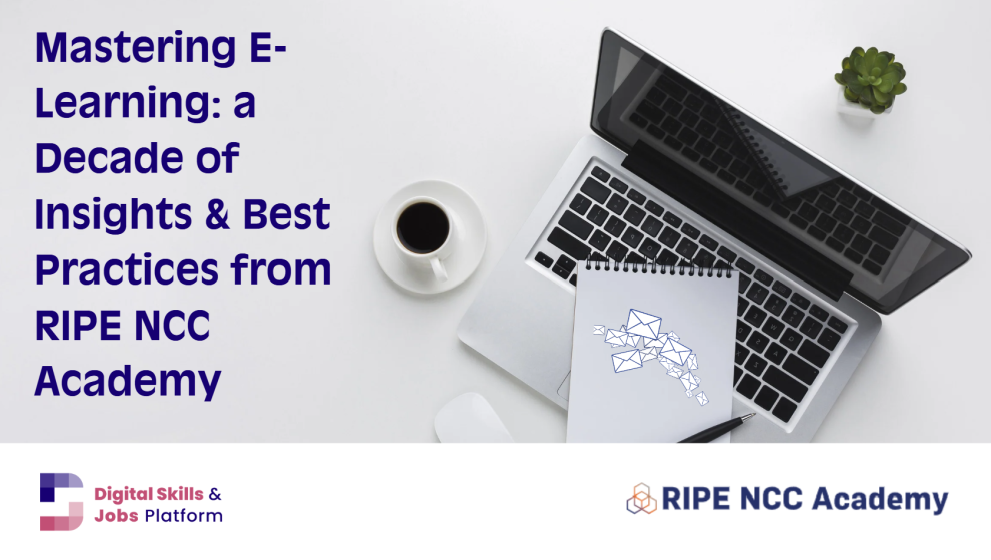Mastering E-Learning: a Decade of Insights & Best Practices from RIPE NCC Academy

Over the past decade, RIPE NCC Academy has provided free self-paced e-learning courses to thousands of learners.
From a comprehensive overview of Internet governance and why it is important in the Internet Governance course, to gaining a better understanding of Border Gateway Protocol security measures, or IPv6 security - our free courses can help upskill anyone.
During this time, we've gained valuable insights into creating effective e-learning content. The 5 best practices we are sharing here have made a significant difference to our learners, and we hope they can serve as inspiration to build your own learning journey.
1) Find out what your learners really need and make it happen
Don’t assume you know what your learners need - ask them. Often, we start creating a training offer or an e-learning course, based on information we want to share - and because we think we know what our learners need. However, our assumptions are not always correct. But when we conducted interviews, this really helped us identify what skills were needed on the job.
We also use surveys in our needs assessment to get a big picture overview of important skill gaps, by asking potential learners to list and prioritise their tasks at work before we start designing a course. This means learners are effectively co-creators of the training, having taken an active role in shaping their own learning journey. This also helps us maximise the return on investment for both learners and the organisation.
The graphs below highlight an essential process in learning design. A key element here is the need to assess both the importance of a topic for people's jobs and their current level of knowledge about the topic. Teaching should focus on topics that are both important for their roles as well as topics that they don’t fully understand yet.
For example, imagine there's a topic that learners know very little about. Yet, if these learners also report that this topic is not relevant to their jobs, then there’s no need to prioritise teaching it. Similarly, if a topic is highly relevant to their work but learners already have sufficient knowledge about it, then there is not much need to include it in the course either.
2) Close collaboration between learning designers and subject matter experts is key
Over time, we have discovered that close collaboration between learning designers and subject matter experts is essential for effective e-learning development. Every course we create is reviewed jointly by subject matter experts and the learning designers, making sure that real-world experience is reflected in our instructional strategies.
In our experience, optimal results are achieved when these roles collaborate closely and have iterative feedback loops to ensure that the content is both accurate and pedagogically sound.
3) The pedagogical approach you choose is more important than the technology you use
While technology and tools are essential for delivering e-learning, it is the pedagogical approach that ultimately helps determine the success of a learning experience.
Effective e-learning is grounded in sound educational principles, such as active learning, spaced repetition, and immediate feedback. These principles help create a learning experience that is not only engaging but also promotes long-term retention and application of knowledge.
At RIPE NCC Academy, we do this by providing realistic scenarios and lab activities that are as close to the learners’ performance contexts as possible and by providing clear and actionable feedback when learners make mistakes.
In this activity, learners are using a virtual lab to check and configure routers. Throughout this task, they need to interpret the output by answering questions like the one you see here.
4) Continuous improvement through feedback
One of the most useful lessons we have learned is the importance of continuous improvement through feedback. Collecting and analysing feedback from learners and instructors helps us identify areas for enhancement.
One very effective and non-intrusive way we collect feedback from our learners is by asking them to rate each module. If a module receives a rating of three stars or less, we ask the learner how they think we can improve it.
We review all feedback each quarter. This iterative process allows us to refine our content, update outdated material, and incorporate new educational strategies.
5) User experience is of key importance
Finally, we have learned that user experience (UX) plays a key role in the effectiveness of e-learning. A well-designed user interface that is intuitive and easy to navigate can significantly enhance the learning experience. Factors such as mobile accessibility (since a large percentage of users access the Internet via their phones), interactive elements, and a visually appealing design all contribute to learner engagement and satisfaction.
Prioritising the UX reduces cognitive load for learners, allowing them to focus more on the content, and less on figuring out how to navigate the platform. Regular usability testing with our learners helps us ensure they can easily find what they need.
By adhering to these principles, we have been able to create high quality and impactful learning experiences that truly make a difference. Are you curious about our e-learning? Take our courses for free at academy.ripe.net!
About the author
Evelien Schilder is a senior learning experience designer and the e-learning service owner at the RIPE NCC. Coming from an academic background with a Ph.D. in Instructional Design & Technology, she uses evidence-informed approaches to design, develop and evaluate engaging and impactful learning experiences, keeping the learners’ needs at the forefront.
About RIPE NCC
Réseaux IP Européens Network Coordination Centre (RIPE NCC), translating to "European IP Networks" in French, is the Regional Internet Registry for Europe, Middle East and Central Asia. Operating as an independent, not-for-profit membership association, we serve over 20,000 members in 76 countries. We register IP addresses and ASNs, and act as the secretariat to the RIPE community.





